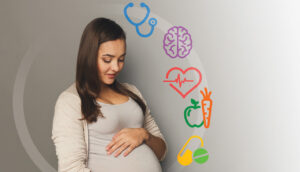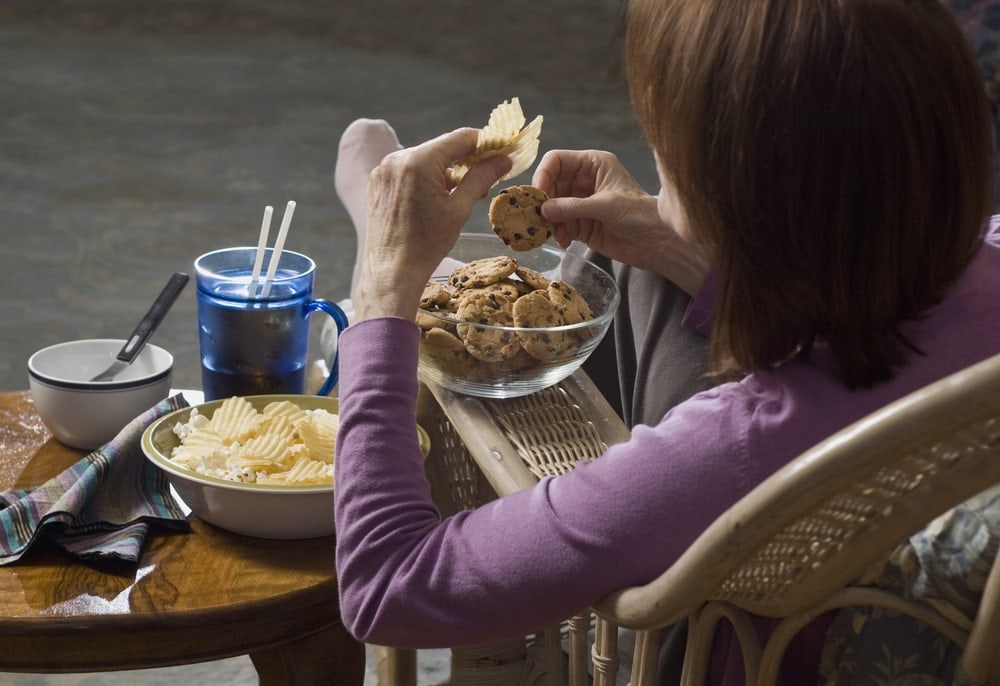Eating disorders are serious mental health conditions that result in abnormal eating habits and patterns. They can manifest during any stage of a person’s life but are most commonly diagnosed in young adults. Unfortunately, eating disorders and pregnancy share several commonalities, including a higher risk for developing significant weight gain during pregnancy, gestational diabetes, preeclampsia, and cesarean delivery. If you or someone you know is struggling with an eating disorder or is pregnant, it is important to know what resources are available to you. In this guide, we will discuss the signs and symptoms of eating disorders, the risks associated with them during pregnancy, and what you can do if you encounter them.
Contents
- 1 What Is An Eating Disorder?
- 2 Relationship Between Eating Disorders and Pregnancy
- 3 Pregnant Women and Eating Disorders
- 4 Difficulties Faced By Someone Who Has Eating Disorders and Pregnancy
- 5 Should Pregnant Women With An eating Disorder Seek Treatment?
- 6 How To Help Someone With Eating Disorders and Pregnancy?
- 7 Conclusion
What Is An Eating Disorder?

An eating disorder is an unhealthy pattern of food consumption that can lead to weight loss or muscle wasting. There are a variety of eating disorders, but the most common are anorexia nervosa and bulimia nervosa. Eating disorders can affect any body size but tend to affect women more often than men.
Eating disorders can be devastating both mentally and physically, and they can have serious consequences for both you and your baby. If you think you may have an eating disorder, don’t hesitate to seek help. There are many resources available, including support groups and therapy sessions. And if you are pregnant, talk to your doctor about the best way to manage your health during this time.
Many signs and symptoms of an eating disorder can occur during pregnancy. However, it is important to remember that not all pregnant women with an eating disorder will experience these symptoms.
-A decrease in appetite or a change in appetite patterns
-Extreme weight loss or gain (even if the woman has not changed her diet)
-Obsession with food, calories, or weight
-Compulsive exercise or extreme restriction of activity to maintain a low weight or achieve a certain body shape
-Eating high amounts of food in short periods (bingeing)
-Fear of gaining weight or being obese
-Excessive thoughts about food or weight
-Rumination (repeated thoughts about food and/or weight)
Relationship Between Eating Disorders and Pregnancy
There is a definite relationship between eating disorders and pregnancy. Eating disorders can lead to an increased risk of developing complications during pregnancy, including gestational diabetes, preeclampsia, and cesarean births. In addition, eating disorders can also lead to lower birth weights and increased rates of infant mortality.
If you are pregnant and have an eating disorder, it is important to get help. There are many resources available to you, including support groups, counseling, and medication. You may also want to consider seeking out a specialist who can provide additional guidance and care.
Also, the relationship between eating disorders and childbirth is complex. Pregnant women with an eating disorder may be more likely to have a cesarean birth, but this does not mean that they have an eating disorder. Cesarean rates are high in the general population, and there are many reasons why a woman might have one. Pregnant women need to talk about their options and risks with their doctors.
There may be many other factors that can contribute to cesarean births, including the health of the mother and the baby. It is important to speak with your doctor to get a full picture of your situation.
Pregnant Women and Eating Disorders

There is a growing trend of pregnant women suffering from eating disorders. This is due to many factors such as the pressure to conform to a certain body image and societal pressures. Eating disorders during pregnancy can lead to serious health problems for both mother and child, including pre-term delivery, low birth weight, and even death.
Sometimes pregnancy and eating disorders can go hand in hand. A woman with an eating disorder may start to restrict her food intake to achieve a certain body shape or size. This can make it even harder for her to get the nutrients she needs during pregnancy and put her and her baby at risk for health problems.
If you are pregnant and suspect that you have an eating disorder, don’t hesitate to seek help. There are many resources available, including hospitals and clinics that specialize in treating eating disorders. You may also want to speak with your health care provider about getting screened for any health conditions that may be related to your eating disorder, such as pre-term birth or low birth weight.
Difficulties Faced By Someone Who Has Eating Disorders and Pregnancy
Some people with eating disorders may have difficulty adjusting to their new pregnancy, as their body undergoes physical and emotional changes. This means that they may encounter several difficulties, which we’ve outlined in this guide.
If you or someone you know is struggling with an eating disorder and pregnancy, please know that help is available. Talk to your doctor or therapist about what steps can be taken to manage your condition and ensure a healthy pregnancy.\r
Some common difficulties faced by those with an eating disorder and pregnancy include:
-Weight gain: Many people with eating disorders are reluctant to eat food, which can lead to weight gain during pregnancy. It’s important to monitor your weight and talk to your doctor if you’re noticing a significant increase in weight. If you’re pregnant and struggling with weight gain, there are many options available to you, including diet and exercise programs.
-Sleep deprivation: Pregnant women often suffer from sleep deprivation due to the extra energy needed for the baby’s development. If you have an eating disorder and are not getting enough sleep, it can add stress to your body and your pregnancy. Talk to your doctor about ways to improve your sleep habits.
-Nausea and vomiting: Pregnant women often experience nausea and vomiting, which can be a side effect of certain medications or conditions. If you’re pregnant and struggling with nausea or vomiting, talk to your doctor about possible treatments.
-The stress of having an eating disorder: Pregnancy can be a challenging time for anyone, but it can be even more difficult for someone with an eating disorder. This is because the stress of having a baby can add to the stress that an eating disorder already brings. If you’re struggling with the stress of having an eating disorder and pregnancy, it may be helpful to speak to a therapist.
-Physical changes: During pregnancy, the body undergoes physical changes that can lead to discomfort. This includes an increase in blood pressure, weight gain, and swelling. If you experience any of these symptoms, talk to your doctor.
If you or someone you know is struggling with an eating disorder and pregnancy, please know that there is help available. Talk to your doctor or therapist about what steps can be taken to manage your condition and ensure a healthy pregnancy.
Should Pregnant Women With An eating Disorder Seek Treatment?
There is no one-size-fits-all answer to this question, as the best course of action depends on the individual situation. However, some experts believe that pregnant women with an eating disorder should seek treatment to ensure their health and the health of their children.
There are a few key things to keep in mind when making this decision: first, it is important to speak with a qualified healthcare professional about your options. This person can help you weigh the pros and cons of treatment and can provide helpful resources.
Additionally, it is important to remember that seeking treatment does not mean that you are weak or defective – many pregnant women with an eating disorder find that treatment helps them regain control over their life and recover from an illness.
Sometimes by seeking a diagnosis and treatment, pregnant women can prevent their eating disorder from becoming too severe or life-threatening.
If you are considering treatment for an eating disorder during pregnancy, be sure to speak with your doctor about your specific situation.
How To Help Someone With Eating Disorders and Pregnancy?

Eating disorders are serious mental illnesses that involve persistent and abnormal eating habits. This can take many different forms, from restricting food intake to binging and purging. While most people know about the dangers of an eating disorder when it is in its early stages, more and more women are getting pregnant and struggling with their weight during pregnancy. Here are some tips on how to help someone with an eating disorder and pregnancy:
1) Be supportive – When someone is dealing with an eating disorder, they may feel like they are alone in their struggle. It can be difficult to open up about what’s going on, but being supportive will help them feel less isolated. Let them know that you’re there for them no matter what, and offer any advice or resources you may have.
2) Listen carefully – One of the main reasons Eating Disorders occur in pregnant women is because they feel like they have to conceal their symptoms from their partner or loved ones. It’s important to LISTEN when someone tells you about their struggles with an eating disorder – don’t rush them or try to fix things on your own. Let them talk until they’ve had a chance to calm down.
3) Respect their wishes – If a pregnant woman with an eating disorder wants to have an abortion, respect their decision. There is no right or wrong answer when it comes to reproductive health, and each individual should be allowed to make their own choices without judgment.
4) Encourage healthy eating – One of the most important things you can do for a pregnant woman with an eating disorder is encourage them to eat a balanced diet. Eating disorders tend to focus on unhealthy foods and diets, so your loved one must get plenty of nutrients and vitamins from their food.
5) Don’t pressure them to get help – If a pregnant woman with an eating disorder is not ready or willing to seek professional help, that’s okay. Remember that they are still dealing with a serious mental illness, and they may need time to work through the problems on their own. However, if they do decide to seek help, be supportive of that decision.
If you or someone you know is struggling with an eating disorder and pregnancy, don’t hesitate to reach out for help. There are many resources available to help, and the support of family and friends can be invaluable.
Conclusion
When it comes to eating disorders and pregnancy, there is a lot of information out there that can be confusing and overwhelming. In this article, we have provided you with a guide on how to best deal with these two disorders together. We have discussed the different types of eating disorders and what symptoms to look out for during pregnancy, as well as give some tips on how to get help if you are struggling. Hopefully, this will help you navigate your way through these difficult times with ease.
Hope this article was of help to you! If you are suffering from mental health disorders, you may seek help from Therapy Mantra. We have a team of highly trained and experienced therapists who can provide you with the tools and skills necessary for overcoming mental health disorders. Contact us today to schedule an online therapy or download our free Android or iOS app for more information.


